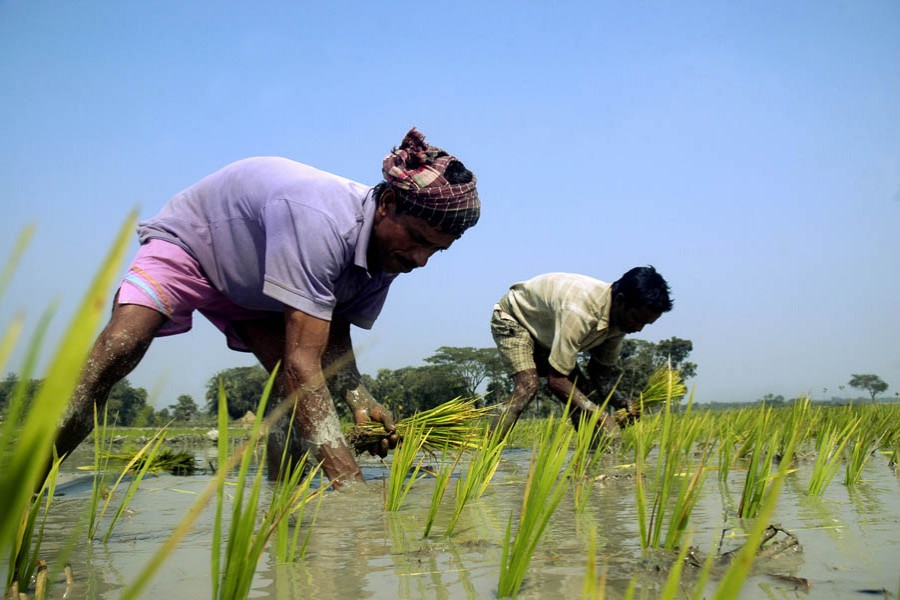
Published :
Updated :

To call the recent changes in the style of cropping and the achievements made in the country's agricultural yields in the last couple of decades amazing is no overstatement. Anyone revisiting Bangladesh after a long gap will be taken by surprise seeing the overall changes in the agro-sector. Apart from impressive increase in the yields of paddy and other crops, the country's agriculture is now steeped in myriad types of technological breakthroughs. The wide use of mechanised agricultural tools in almost every phase of cultivation has been a common feature over the last couple of years. Yet there are grey patches amidst the beaming scenario. Some of them might remind many of the semi-primitive state that prevailed in the country's agriculture decades ago.
Although a large section of farmers are in regular touch with field-level agricultural officials, a lot of them are left in the lurch. Due to being in remote and far-flung areas, they continue to grow crops by applying age-old farming techniques. On occasions, they are found stuck in practices declared obsolete in many developed parts of the country. A most alarming feature of these adversities is the farmers being coerced into harmful practices. These practices range from those related to soil preparation, use of pesticides and insecticides, irrigation, sowing seeds to transplanting of rice seedlings. In the recent times, dozens of syndicates and unscrupulous quarters have been found exploiting the unlettered and innocent farmers. Besides depriving them of their rightful shares of the yields, these elements tempt them with money. The latter practice is increasingly being found in the task of coercing unsuspecting farmers into selling the topsoil of their agro-lands.
The topsoil of farmlands is mostly grabbed by the owners of brick kilns. Presently it is a common practice among brickfield operators in the country's northern and central parts to collect the most ideal soil for making their bricks. Syndicates are assigned to mislead the farmers about the uselessness of this otherwise vital segment of the farmland. Not all farmers are gullible and can be convinced, as the necessity of this soil has been passed on to them by their forefathers. But being badgered repeatedly, they finally give in to the persuasions. They sell the golden chunks of their cropland to the brick kiln owners. In many cases, instant monetary gain or profit is too tempting to resist on the part of poor farmers. It makes them oblivious to the damages that invariably result from the removal of topsoil from farmlands.
Croplands without topsoil eventually become tracks of barren waste land. Officials from the Department of Agricultural Extension (DAE) are normally assigned to make farmers aware of the demerits of removing topsoil layers from farmlands. In many areas they have been seen persuading the farmers not to sell the valuable topsoil. On occasions they are found to be at loggerheads with the brick kiln people. Thanks to their power and influence due to their being blessed by local unscrupulous quarters, the Department of Agricultural Extension (DAE) and non-government groups have to keep a low profile. In a different scenario, few DAE officials are seen explaining to the ignorant farmers the disastrous impact of selling topsoil from their farmlands.
The removal of topsoil from farmlands invites scores of hazards for the country's agriculture. With the topsoil gone, the productivity of the farmlands continues to decline. Once a farmland is shorn of its topsoil, its impact appears to be permanent. As the bitter experiences of farmers demonstrate, the yield-capacity of cropland allegedly comes down to one crop a year in place three crops. In order to make up for this deficiency, the farmers resort to increased use of chemical fertilisers and pesticides. During the annual monsoon flooding, these substances are seen being washed away into the surrounding rivers and low-lying wetlands. Few people otherwise aware of the damages caused to farmlands due to the removal of topsoil give serious thought to its environmental impact. Besides, mindless digging for collecting this precious soil creates sporadic trenches and ditches in the farmlands. They become ideal places for stagnant water and thus a breeding ground for weeds. Unless the water is removed, farmers find it difficult to grow paddy and other major crops on their previously fertile land.
It is no exaggeration to say that topsoil grabbing from farmlands has now emerged as a great damper for the country's agriculture. According to agro-experts, topsoil is the protein of soil. It contains all the nutrients and organic materials that crops need during their process of growth. A section of environmentalists maintain that the traditional brick kilns, located near the farmlands ought to be replaced with factories producing green bricks. These products use compressed composite of river mud and cement. These bricks do not require to be burnt in the kilns; instead they are dried in the sun. In many countries in the world, traditional brick kilns are fast being phased out on considerations of protecting the environment.
In Bangladesh, too, factories producing green bricks have started coming up. Products of these factories continue to make inroads into the market of traditionally made bricks. The strongest logic behind banning brick kilns in phases is, however, its deleterious impact on the country's agriculture. Already excavating quarries in farmlands and dumping sand on vast tracks of arable land have added to farmers' miseries in many parts of the country. Notwithstanding the new openings to technology-based modern practices in the country's agriculture, old and freshly devised crooked practices pose a potential threat to the sector.


 For all latest news, follow The Financial Express Google News channel.
For all latest news, follow The Financial Express Google News channel.